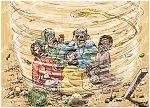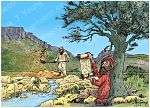Bible Cartoon: <-- Job : Psalms -->
Click on Add to cart button below shopping cart.
Purchased Bible Cartoons do not have watermarks. Links to Cartoons provided on email once purchase is completed.Psalms
Book type: Wisdom
Authors (no. of Psalms written by): David (73), Asaph (12), sons of Korah (9), Solomon (2), Heman (1), Ethan (1), Moses (1) and anonymous (51.)
No. of chapters: 150
Key character(s): God the Father features prominently in every psalm. The titles reflect who the first person (“I”) narrator is, in most cases David.
Brief description: Psalms – The faith of Israel set to music.
Theological outline:
The five divisions (books) correspond roughly to the five books of Moses.
01) Book 1 – The first book is like Genesis, detailing blessing, fall, and redemption (1:1-41:13)
02) Book 2 – Like Exodus, this book describes ruin, and rescue by God (42:1-72:20)
03) Book 3 – As Leviticus covers God’s tabernacle, this book covers God’s temple (73:1-89:52)
04) Book 4 – Numbers tells of Israel’s relationship to other nations; this book tells of God’s kingdom compared to neighbouring nations (90:1-106:48)
05) Book 5 – Deuteronomy was about God and his Word, and this book consists of praise for God and his Word (107:1-150:6)
Types of Psalm
1) Psalms of lamentation or complaint cry out for help in a situation of distress or frustration.
(Psalms of lament: 3, 4*, 5, 6, 7, 12, 13, 17, 22, 25, 26, 28*, 35, 38, 39, 40, 41, 42, 43, 44, 51, 54, 55, 56, 57, 59, 60, 61*, 63*, 64, 69, 70, 71, 74, 77, 79, 80, 83, 85, 86, 88, 90, 94, 102, 109, 123, 126, 130, 134, 137, 140, 141, 142, 143, 144)
This is the largest category, accounting for about 37% of all Psalms.
2) Psalms of thanksgiving describe a situation of distress & how God delivered the psalmist.
(Psalms of thanksgiving: 9, 10, 18*, 30, 31, 32, 34, 66, 92, 107, 116, 118, 120, 124, 129, 138, 139.)
3) Hymns lift the congregations praise to God, describing God’s greatness & majesty.
(Hymns: 8, 19, 29, 33, 65, 100, 103, 104, 105, 111, 113, 114, 117, 135, 136, 145, 146, 147, 148, 149, 150.)
This is the 2nd largest category, accounting for about 14% of all Psalms.
4) Wisdom psalms probe life’s mysteries to teach the congregation about itself & God.
(Wisdom psalms: 1, 14, 36, 37, 49, 53, 73, 78, 112, 119, 127, 128, 133.)
5) Kingship psalms detail the role of the human king in God’s rule over the people. They also point ahead to the Messiah, who would inaugurate God’s kingdom.
(Kingship psalms: 2, 18*, 20, 21, 28*, 45, 61*, 63*, 72, 89, 101, 110, 132*.)
6) Entrance ceremonies provide questions & answers to teach the expectations God has of his worshippers. (Entrance ceremonies: 15, 24.)
This is the smallest category of Psalms.
7) Enthronement psalms praise Yahweh as the King over his universe.
(Enthronement psalms: 47, 93, 96, 97, 98, 99.)
8) Songs of Zion praise God indirectly by describing the Holy City where he has chosen to live among his people & be worshipped.
(Songs of Zion: 46, 48, 76, 84, 87, 122, 132*.)
9) Psalms of confidence express trust in God’s care for & leadership of his people.
(Psalms of confidence: 4*, 11, 16, 23, 27, 62, 125, 131.)
10) Prophetic psalms announce God’s will to his worshipping people.
(Prophetic psalms: 50, 52, 58, 81, 82, 91, 95.)
11) Liturgical psalms describe activities & responses of God’s worshipping congregation.
(Liturgical psalms: 67, 68, 75, 106, 108, 115, 121.)
[Source: NIV Disciple’s Study Bible]
*
6 Psalms appear in 2 of the above categories, all the others only appear in 1 category.
Psalm 4 appears in both category 1) Lamentation & 9) Confidence.
Psalm 18 appears in both category 2) Thanksgiving & 5) Kingship.
Psalm 28 appears in both category 1) Lamentation & 5) Kingship.
Psalm 61 appears in both category 1) Lamentation & 5) Kingship.
Psalm 63 appears in both category 1) Lamentation & 5) Kingship.
Psalm 132 appears in both category 5) Kingship & 8) Songs of Zion.
The book of Psalms contains some of the most beautiful poetry ever written, but many people find that these verses describe human problems so well that they make excellent prayers. The book of Psalms is the place to go when you’re hurting.
The Hebrew title of the book translates to “praises.” The word “psalm” comes from the Greek psalmoi, meaning “songs.” This book is also called the Psalter. Originally, these 150 poems were meant to be sung and were used in ancient Jewish worship services, accompanied by lyres, flutes, horns, and cymbals. King David established a 4,000 piece orchestra to play during worship (1 Chronicles 23:5).
Because the Psalms are poems, they use poetic devices such as imagery, metaphors, similes, personification, and hyperbole. In reading the Psalms, believers must take these tools of language into account.
Jesus Christ loved the Psalms. With his dying breath, he quoted Psalm 31:5 from the cross: “Father, into your hands I commit my spirit.” (Luke 23:46, NIV)
Themes in the Book of Psalms:
Psalms covers timeless themes, which explains why it is as relevant to God’s people today as when the songs were written thousands of years ago. Trusting in God is certainly the dominant theme, followed by praising God for his love. Rejoicing in God is simply the joyous celebration of Jehovah. Mercy is another important theme, as David the sinner pleads for God’s forgiveness.
[Source: http://christianity.about.com/od/oldtestamentbooks/a/JZ-Book-Of-Psalms.htm]





